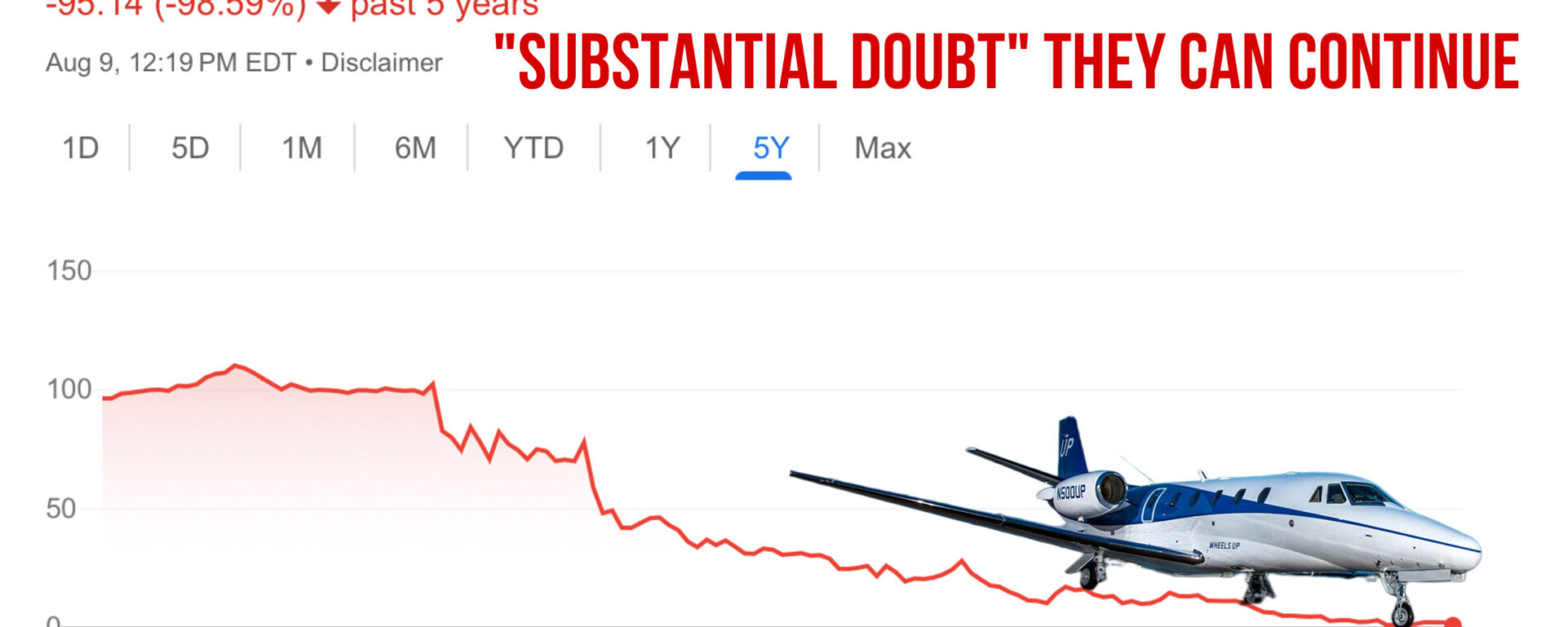
Wheels Up, is aiming for one final chance with the support of Delta Air Lines and other investors. Recent developments suggest a lifeline for the New York City-based company, which faced a dire financial landscape in the preceding months.
The net losses reported for the specified periods reveal a challenging financial landscape: In the Three Months Ended June 30, 2023, the company faced a substantial net loss of -$160,593,000, painting a grim picture of its financial performance for that period. Similarly, for the Six Months Ended June 30, 2023, the situation was even more concerning, with a staggering net loss of -$261,459,000, indicating ongoing financial struggles.
However, this dire situation has triggered a strategic response. Last week, Wheels Up secured $15 million in emergency funding from Delta, a sign of its earnest pursuit of a revival. The impending agreement signifies the company’s decision to cede 95% ownership in exchange for a significant capital infusion of $500 million from Delta, Knighthead Capital Management, Certares Management, and other investors. This initiative comes as a last-ditch effort to avert bankruptcy, a scenario that Wheels Up had contemplated as a potential course of action.
The proposed nonbinding agreement encompasses a $400 million term loan, which includes a substantial contribution of $150 million from Delta, alongside a $100 million liquidity facility. In return, Delta and other investors will acquire newly issued Wheels Up Class A common stock, indicating a shift in ownership dynamics.
This transaction holds a layer of irony, as Delta had previously owned Wheels Up’s private jet management business entirely. In 2020, Delta relinquished this unit to Wheels Up in exchange for a 20% stake. Recently, this division underwent another transformation, with Wheels Up selling it to Airshare for an undisclosed fee.
Delta’s involvement brings forth a partnership that aims to create new prospects for Wheels Up, charting a course for strategic, operational, and financial enhancements. Delta’s unparalleled expertise in premium travel, customer loyalty, corporate sales, operational reliability, and aircraft maintenance, coupled with Certares’ and Knighthead’s global reach, is poised to expedite Wheels Up’s trajectory towards profitability.
The leadership landscape is also undergoing a shift, with Wheels Up CFO Todd Smith continuing to serve as the firm’s interim CEO, and Delta CFO Dan Janki stepping in to replace Wheels Up chairman Ravi Thakran.
However, these efforts to turn the tide face uphill challenges. Wheels Up has grappled with quarterly net losses consistently since its 2021 initial public offering. The second quarter of this year bore witness to these losses escalating by 73% to reach $160 million, reflecting a year-over-year increase. In terms of liquidity, Wheels Up reported having $152 million in cash by the end of Q2, a marked decline from the $586 million reported at the close of 2022, and even the $363 million recorded in Q1. During this same period, adjusted earnings before taxes, interest, depreciation, and amortization (EBITDA) displayed relative stability.
The complexity of Wheels Up’s operational landscape is another contributing factor to its financial hurdles. A string of acquisitions spanning five years has introduced operational intricacies due to varying certifications and constraints on crew reallocation.
Amidst these challenges, Wheels Up has continuously attracted new members while maintaining specific policies, such as its capped hourly rate. However, these initiatives have come at a price, leading to inflated operating costs.
The COVID-19 pandemic’s impact on Wheels Up has been a mixed bag. While it affected the availability of flight crews, the surge in demand for private jet travel during the pandemic acted as a safeguard against potential financial distress.
The new majority owner, Delta, stands to benefit from the steady demand that private jet travel continues to experience. An impressive 93% of customers who turned to private flying during the pandemic have remained loyal. However, the challenge now lies in how Delta and the investors capitalize on this demand.
Against this backdrop, Wheels Up’s fleet predominantly consists of King Air turboprops, Citation Xs and XLs, and Hawker 400 light business jets following the sale of its private jet management business. With the $500 million investment, the company had expressed intentions to bolster its corporate business segment, responsible for approximately one-quarter of all sales.
The pre-existing exclusive partnership between Wheels Up and Delta could play a pivotal role in shaping the future trajectory. This partnership offers customers Delta benefits through a Wheels Up membership, with a specific focus on the lucrative business charter clients.
As the management landscape undergoes transformation, the possibility of divesting certain past acquisitions is being explored to achieve more robust synergies. Additionally, Certares, which owns Internova Travel Group—one of the largest U.S. travel agencies with over 100,000 advisers—could potentially unlock new avenues for sales growth. The fusion of these strategic initiatives with Delta’s backing introduces a new chapter for Wheels Up, laden with challenges and possibilities.

